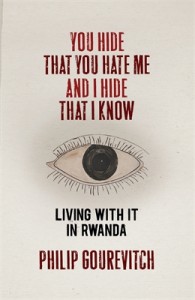 Dallas Holocaust Museum/Center for Education and Tolerance is presenting the Upstander Speaker Series Spring Lecture featuring award-winning author Philip Gourevitch tonight at 7 p.m.
Dallas Holocaust Museum/Center for Education and Tolerance is presenting the Upstander Speaker Series Spring Lecture featuring award-winning author Philip Gourevitch tonight at 7 p.m.
Gourevitch’s earth-shattering 1998 book, We Wish to Inform You That Tomorrow We Will Be Killed with Our Families, opened readers eyes to Rwanda’s genocide: In one hundred days nearly a million people were murdered by their fellow citizens, and the world refused to stop it. Now, on the twentieth anniversary of the slaughter, Philip Gourevitch returns to Rwanda.
A fiercely beautiful literary reckoning, You Hide That You Hate Me and I Hide That I Know explores with great insight and intimacy a society in which killers and survivors live again as neighbors, grappling with the burdens of memory and forgetting.
You Hide That You Hate Me and I Hide That I Know plunges into the lives of a vast cast of characters: from perpetrators and victims in tiny peasant communities to street kids, businessmen, artists, judges, the national cycling team to the country’s revolutionary leaders and their opponents. As Gourevitch weighs their accounts of Rwanda’s unexpected successes and its enduring weaknesses, he also revisits the wars of the genocide’s aftermath that continue in Congo. And he takes critical stock of how Western conventional wisdom—with its self-exculpations and its tendency to view African politics through the reductive lenses of humanitarian pity or punitive human rights absolutism—clashes with the defiant ethic of self-determination that has guided Rwanda’s reconstruction. Does the West know what is best for a traumatized and impoverished postcolonial state, seeking to create itself as if from scratch? Is it reasonable to judge such a state strictly by our own imperfectly achieved ideals? Gourevitch’s investigation of Rwanda’s unprecedented experiment in national reconstruction continually invites us to think again.
Combining travelogue and investigative reportage, personal narratives and political debates, Gourevitch’s stories of life after genocide are at once as essential and as ultimate as classical myths. “You hide that you hate me and I hide that I know” is a stark Rwandan adage that describes the formula by which barbarism becomes civilization, and it is now a book about the challenges of forging a sane and habitable history after near annihilation.”
The event will be held at SMU’s Hughes-Trigg Student Center located at 3140 Dyer St. The lecture is slated to start at 6:30 p.m. but they are also featuring a pre-lecture workshop from 3:30 p.m. – 5:30 p.m.
You can reserve tickets via email at communications@dallasholocaustmuseum.org and you can find more info here.




